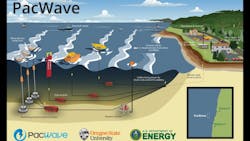US DOE to invest $112.5 million to promote wave energy
The US Department of Energy (DOE) says that it will fund up to $112.5 million to promote and commercialize wave-created power in what it describes as “its largest ever investment in marine energy.”
This five-year investment will significantly accelerate the design, fabrication, and testing of multiple wave energy converters (WECs), which harness power from ocean waves.
The DOE says that if even a portion of this technical resource potential is captured, wave energy technologies would make significant contributions to US energy needs by powering American electric grids and at-sea activities.
Administered by the Water Power Technologies Office (WPTO), this investment is designed to support development and testing of WECs to provide power for:
- At-sea applications, such as ocean observation, aquaculture, and marine carbon dioxide removal.
- Coastal community needs, such as power and clean drinking water production.
- Utility electricity needs. WECs with utility applications may be tested at PacWave South, the first pre-permitted, grid-connected test facility for wave energy technologies in the continental United States that is expected to be operational next year.
The DOE says that this investment will help identify and mature high-potential WEC technologies, reduce financial risks for developers and incentivize investors, progress technologies at smaller scales while developing toward utility scale, and increase learning for installation, operations, and maintenance.
The full funding opportunity is available in the Office of Energy Efficiency and Renewable Energy Program Information Center. WPTO will host an informational webinar at 11 a.m. ET on October 9, 2024, to discuss the funding opportunity and areas of focus. Concept papers are due by 5 p.m. ET on October 25, 2024.
Funding for this opportunity is subject to congressional appropriations.
